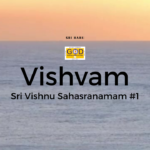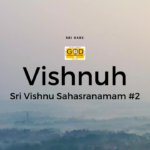Muktaanaam Paramaagati
Bhagavan is called ‘muktAnAm paramAgathi’ because He is the Supreme goal for even muktAs. The muktAs are realized souls. They are liberated souls. They are ever free. If we look at a common jiva, usually we roam around this world restlessly trying to attain something that we desire. But even after getting what we desire, we are not happy. We are not satisfied. We always want something else, or something more. And we start going behind them. Is it not? But in the case of a liberated soul, they do not have such desires. They have no cravings. They have nothing to attain either in this world or the other world. That is how they are. But even such muktAs, even such jnAnis, such liberated souls, realized souls… [even] they desire to listen and to sing the glories of Bhagavan.
That’s why in Srimad Bhagavatam, it says,
“AtmArAmAshcha munayaha nirgranthA apyurukramE |
kurvanti ahaitukIm bhaktim ittham bhUtaguNo harih ||”
The divine attributes and the divine leelAs of Bhagavan are such that even muktAs, even liberated souls, desire to sing and enjoy these leelAs.
That’s why our Sri Guru Maharaj in a very sweet Madhurageetham, he sings,
“muni Shukarum yogi BhIshma pitAmaharum
panDithan Uddhavanum mohitanarE”
“muni shukarum” – in Srimad Bhagavatam we see how Shukacharya, who was a jnAni, who was a ‘garbhashreeman’, who was a jivan mukta… he learnt this entire Bhagavatam from his father and Bhagavan Sri Veda Vyasa and he also narrated this Bhagavatam to Parikshith. That is the beauty of Bhagavan’s divya guNa, His kalyaNa guNas. And that is what attracts even these muktAs.
In Srimad Bhagavatam, we find the description of Vaikunta. And while describing Vaikunta and people who are there in it, Bhagavatam says “svadrishtavadbhihi”, which means only realized souls are in Vaikunta. That’s why Bhagavan is called ‘muktAnAm paramAgathi’
With this thought of Bhagavan, whose divine leelAs (divine sports) and divya gunas (divine attributes) are such that they enchant even the muktAs, let us offer this day to Bhagavan by chanting Mahamantra three times.
Hare Rama Hare Rama Rama Rama Hare Hare|
Hare Krishna Hare Krishna Krishna Krishna Hare Hare||
Watch the YouTube video for this Nama here:






